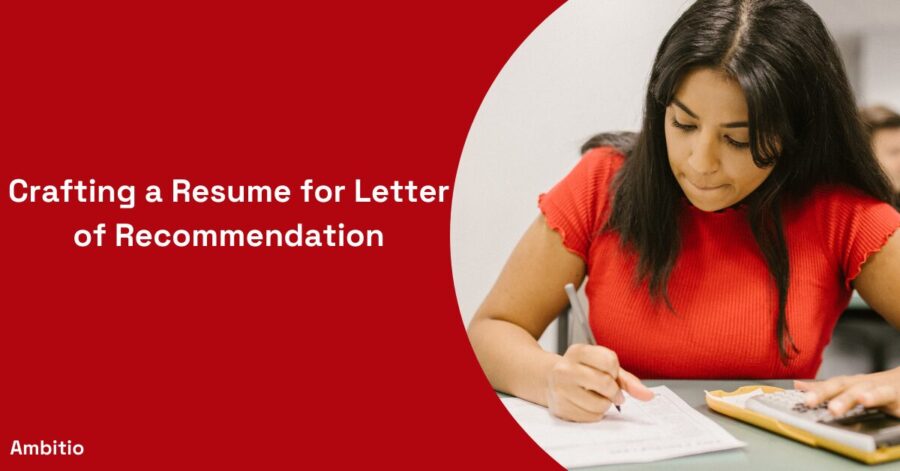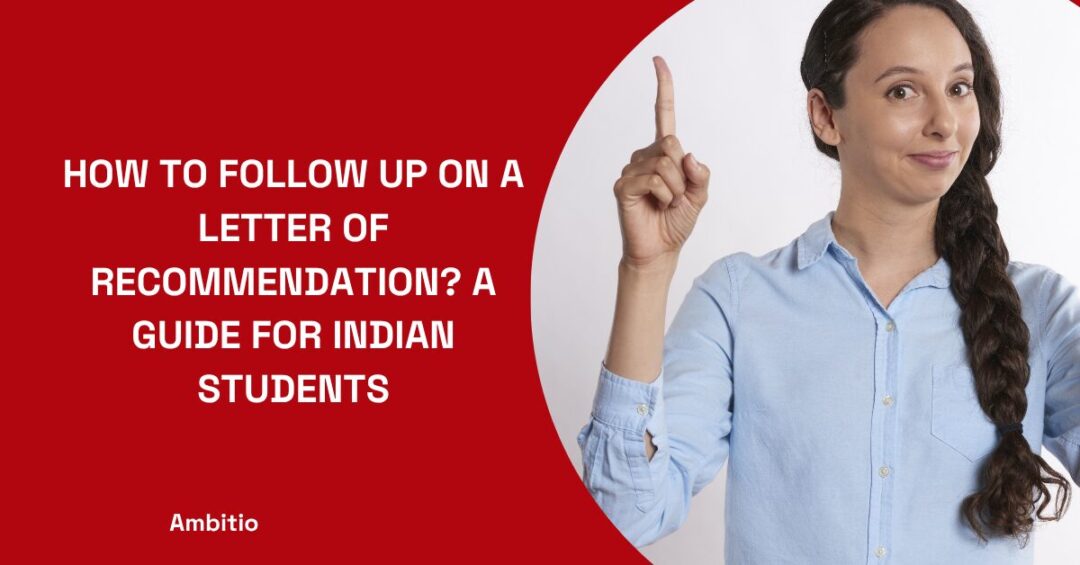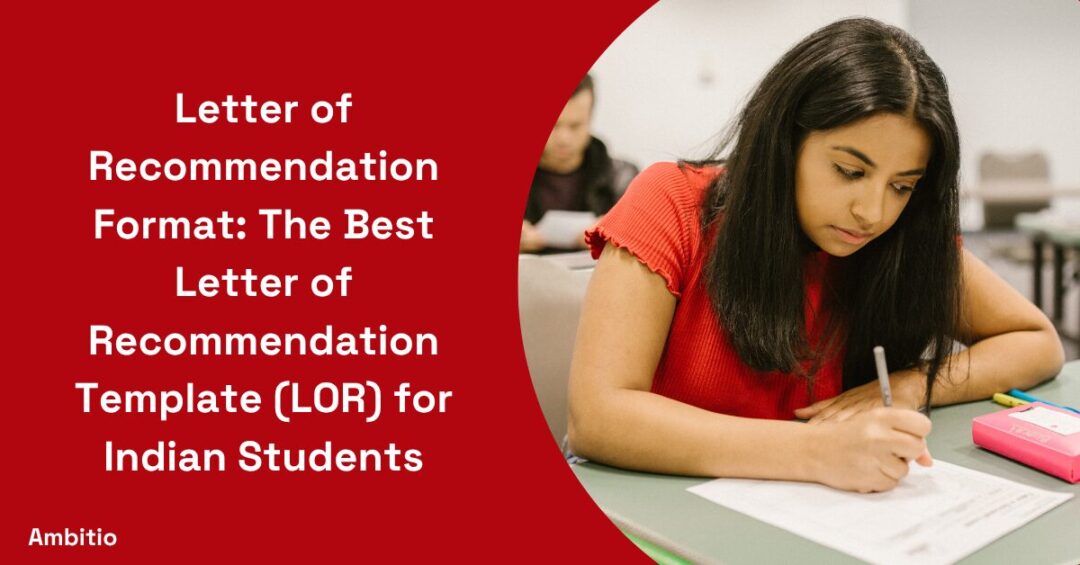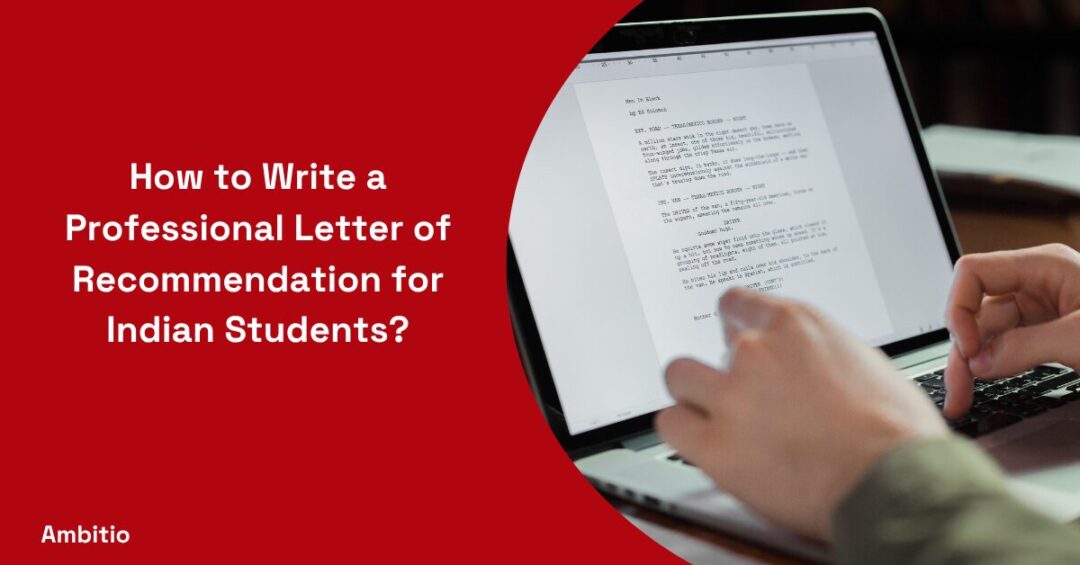13 December 2024
6 minutes read
Crafting a Resume for Letter of Recommendation

A letter of recommendation is a crucial document that can significantly impact your chances of securing a job, admission to a college, or even a scholarship.
It is a letter written by a person who knows you well and can vouch for your skills, qualities, and suitability for the specific purpose you need it for.
Whether you are asking for a letter, writing one, or providing information to your recommender, it’s essential to understand what makes a strong letter of recommendation.
The Importance of a Resume for a Letter of Recommendation
Your resume and the letter of recommendation are two critical components of a job application or college admission.
A resume outlines your professional and academic achievements, while a recommendation letter provides an external perspective on your personal qualities, work experience, and capabilities.
Providing your resume to the person writing your recommendation letter can help them craft a more compelling and accurate letter.
Preparing Your Resume for a Letter of Recommendation
Before you ask for a recommendation letter, it’s essential to have an updated and well-organized resume. Your resume should include your education, work experience, skills, and any relevant achievements. Here are some tips to consider:
- Update Your Resume: Ensure that your resume is current and includes all your recent accomplishments, roles, and responsibilities.
- Highlight Relevant Experience: Emphasize the experiences and skills that are most relevant to the position or purpose for which you need the recommendation.
- Be Specific: Include specific examples of your achievements and how they demonstrate your skills and qualities.
- Use a Professional Format: Use a clean and professional format for your resume. Arial or Times New Roman are recommended fonts.
Asking for a Letter of Recommendation
Once your resume is ready, you can approach someone to ask for a letter of recommendation. Here are some steps to follow:
- Choose Your Recommender Wisely: Select someone who knows you well, has worked closely with you, and can provide a strong recommendation.
- Provide Your Resume: Providing your resume will help your recommender recall specific examples of your work and write a more effective recommendation.
- Be Clear About Your Purpose: Clearly explain why you need the recommendation letter and what you hope to achieve with it.
- Give Them Time: Don’t wait until the last minute to ask for a recommendation. Provide your recommender with ample time to write the letter.
Writing a Great Letter of Recommendation
If you are asked to write a letter of recommendation, it’s important to understand how to craft a compelling letter that will help the person you are recommending. Here are some tips:
- Begin Writing by Introducing Yourself: Start by stating your name and title, and explain your relationship with the candidate.
- Be Specific: Use specific examples to highlight the person’s traits and characteristics that make them a great fit for the role.
- Highlight Their Strengths: Focus on the person’s professional skills, personal strengths, and accomplishments.
- Keep it Professional: Use a professional tone and language throughout the letter.
- Follow the Proper Format: Use a standard business letter format, starting with a salutation (“Dear [Name]” or “To Whom It May Concern”), followed by an introduction, body, and conclusion.
Remember, a well-crafted letter of recommendation can make a significant difference in someone’s application for a job, college, or scholarship.
Whether you are writing a letter, asking for one, or providing your resume for a letter of recommendation, it’s essential to understand the components of a strong recommendation letter.
Types of Recommendation Letters
There are various types of recommendation letters, each serving a different purpose. Here are some common ones:
- Academic Recommendation Letter: This is a letter written by a teacher, professor, or academic advisor to recommend a student for college admission, a scholarship, or a specific academic program.
- Professional Recommendation Letter: This letter is written by a current or former employer, colleague, or client to recommend someone for a job, promotion, or a professional association.
- Character Reference Letter: This is a letter written by someone who knows the person well and can vouch for their character and personal qualities. It may be used for court proceedings, adoption processes, or other personal matters.
- Graduate School Recommendation Letter: This is a letter written by a professor or professional mentor to recommend a student for admission to a graduate program.
Each type of recommendation letter will have specific elements that should be included, depending on the purpose of the letter. Be sure to understand the requirements and expectations of the letter before you begin writing or ask someone to write one for you.
Components of a Strong Recommendation Letter
A strong recommendation letter should include the following components:
- Introduction: Start by stating your name and title, and explain your relationship with the candidate. Mention how long you have known the person and in what capacity.
- Body: This is the main part of the letter where you will provide specific examples of the person’s skills, qualities, and accomplishments. Be sure to highlight how these traits make the person a good fit for the position or purpose for which they are being recommended.
- Conclusion: Sum up your recommendation and express your confidence in the person’s abilities. Be sure to include your contact information in case the reader has any questions or needs more information.
Tips for Writing an Effective Recommendation
Here are some tips to help you write an effective recommendation letter:
- Be Genuine: Be sincere in your recommendation. If you don’t feel comfortable recommending the person, it’s better to decline the request rather than write a half-hearted or insincere letter.
- Be Specific: Use specific examples to highlight the person’s skills and qualities. Avoid vague statements and cliches.
- Focus on the Positive: Highlight the person’s strengths and positive qualities. If there are any areas where the person could improve, mention them constructively, but focus on the positive.
- Be Concise: Keep your letter concise and to the point. A one-page letter is usually sufficient.
- Proofread: Make sure to proofread your letter carefully for spelling and grammar errors.
Remember, your recommendation can have a significant impact on the person’s application, so take the time to write a thoughtful and compelling letter.
When to Decline Writing a Recommendation Letter
It’s important to understand that it’s okay to decline writing a recommendation letter if you don’t feel comfortable recommending the person. Here are some situations where it might be better to decline the request:
- You Don’t Know the Person Well: If you don’t know the person well enough to provide a detailed and genuine recommendation, it’s better to decline the request.
- You Can’t Provide a Positive Recommendation: If you have concerns about the person’s skills, qualities, or suitability for the purpose they are seeking the recommendation, it’s better to decline the request.
- You Don’t Have the Time: If you don’t have the time to write a thoughtful and detailed recommendation, it’s better to decline the request and let the person know so they can ask someone else.
Remember, a lukewarm or insincere recommendation can be worse than no recommendation at all, so it’s important to be honest with yourself and the person asking for the recommendation.
The Role of a Brag Sheet in a Recommendation Letter
A brag sheet is a document that outlines your achievements, skills, and qualities. It can be helpful to provide a brag sheet to the person writing your recommendation letter to help them recall specific examples of your work and write a more effective recommendation. Here are some tips for creating a brag sheet:
- Be Specific: Include specific examples of your achievements and how they demonstrate your skills and qualities.
- Be Concise: Keep your brag sheet concise and to the point. Aim for one page, if possible.
- Highlight Relevant Experience: Emphasize the experiences and skills that are most relevant to the position or purpose for which you need the recommendation.
- Include a Variety of Examples: Include a mix of academic, professional, and personal achievements to provide a well-rounded picture of your abilities.
Remember, your brag sheet is a tool to help your recommender write a more effective recommendation, so take the time to create a thoughtful and detailed document.
Conclusion
Crafting a resume for a letter of recommendation is an essential step in securing a strong and effective recommendation letter. A well-prepared resume and a detailed brag sheet can help your recommender recall specific examples of your work and write a more compelling letter.
Remember to choose your recommender wisely, provide them with all the necessary information, and give them ample time to write the letter. If you are asked to write a recommendation, be sincere, specific, and focus on the positive traits of the person.
And, if for any reason you don’t feel comfortable or capable of providing a strong recommendation, it’s okay to decline the request. Ultimately, a thoughtful and well-crafted recommendation letter can make a significant difference in someone’s application, whether it’s for a job, college admission, or a scholarship, so it’s worth taking the time to get it right.
FAQs
What is a Letter of Recommendation?
A letter of recommendation is a document written by someone who can vouch for your skills, qualities, and suitability for a specific purpose, such as a job, college admission, or scholarship.
How Do I Ask for a Letter of Recommendation?
Choose a recommender who knows you well and can provide a strong recommendation. Provide your resume, explain why you need the recommendation, and give them ample time to write the letter.
What Should I Include in My Resume for a Letter of Recommendation?
Your resume should include your education, work experience, skills, and any relevant achievements. Highlight the experiences and skills that are most relevant to the purpose for which you need the recommendation.
How Do I Write a Strong Letter of Recommendation?
Start by introducing yourself and explaining your relationship with the candidate. Use specific examples to highlight the person’s traits and characteristics, focus on their strengths, keep a professional tone, and follow a standard business letter format.

You can study at top universities worldwide!
Get expert tips and tricks to get into top universities with a free expert session.
Book Your Free 30-Minute Session Now! Book a call now




























